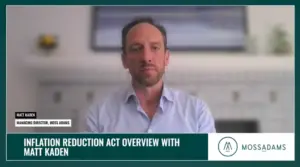Assessing the Value of Early-Stage PE Investments
Valuing venture or early-stage private equity investments can be tricky since they don’t typically have revenues or cash flow yet. As such, applying traditional valuation methodologies like considering discounted cash flow (DCF) may not be appropriate for new technologies and early-stage investments.
On this episode of E2B: Energy to Business, an Opportune podcast, Voice of B2B, Daniel Litwin talked with James Hanson, Managing Director with Opportune Partners LLC, an independent investment banking and financial advisory affiliate of Opportune LLP. They broke down strategies for maneuvering early-stage investments in young companies, specifically around private equity investments in the energy sector.
Hanson has over 30 years of commercial and investment banking experience. He focused on traditional investment banking for the first half of his career, such as commercial lending. In the last 15 years, he spent his time on fairness opinions, solvency opinions, and valuations. Over the past decade, he has often seen the early-stage investment valuation question come up a lot.
“As we think about early-stage and venture investing, it kind of revolves around two aspects,” Hanson says. “The first would be new technologies. The second is along the lines of project finance.”
As Hanson explains, valuing an early-stage investment or technology is difficult terrain to predict since they often rarely have good comparables and have yet to produce significant cash flow or revenue. Financially, one new technology can be very different from another, making comparisons difficult. So, which valuation methodologies are the most effective for these early-stage investments? According to Hanson, a pragmatic method for valuing these types of companies and/or technologies is the cost-based approach (“Cost Approach”).
“It [the cost-based approach] ends up becoming less of throwing numbers on a spreadsheet exercise and more of a due diligence exercise,” Hanson says. “So, what we’ll do is typically talk to the management teams, talk to the people who are working on the products, and dig in to try to see what work has been done, what work needs to be done, what the plan is, where did you think it was before you started, etc.? It’s a case-by-case basis.”
Listen to hear more on private equity investment valuations in the energy sector.






